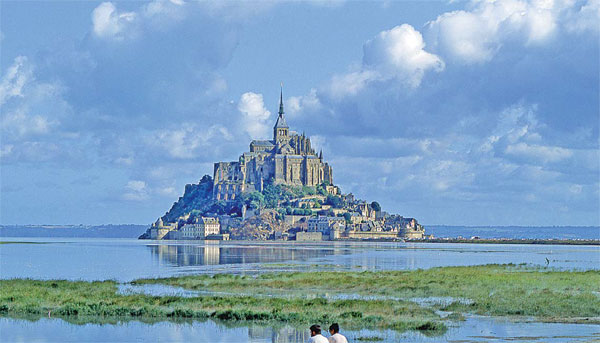French city seeks ties with China
By Tuo Yannan in Paris (China Daily Europe) Updated: 2015-06-07 14:52Rouen hopes to build on links in tourism and education by inviting companies to consider Normandy
Normandy, in northwestern France, has had some notable successes in attracting Chinese tourists, students and companies to help boost the area's economy.
But there is a push on for closer relations and one local official says they're just in the early phases of solidifying the relationship.
|
Le Mont-Saint-Michel is a rocky tidal island and a commune in Normandy. |
"We're trying to develop the economic relationship with China," says Frederic Sanchez, president of the Metropole Rouen Normandie, a metropolitan government structure covering the city of Rouen and several medium-sized cities around it.
In trying to draw the attention of China to the area's business attractions, Sanchez says the area would like to build on the long-standing tourism and educational ties.
"To cater to Chinese tourists, we are to build one or two hotels specialized for welcoming Chinese tourists, adapted to Chinese tourists' lifestyle," Sanchez says.
Rouen, home to some 500,000 people living in 70 different communes, is the capital of the Upper Normandy region and a leading economic center.
The region is also a destination for Chinese college students. In the past decade, the local government has signed many bilateral educational agreements with its Chinese counterparts.
Neoma Business School signed an agreement with Nankai University in Tianjin in June 2011 to foster student and teaching staff exchanges starting in January 2012.
Agreements also were signed between the National Applied Science Institute in Rouen, a highly ranked engineering school, and some Chinese middle schools.
"We started to work with Tianjin in 2011. It was an initiative of Laurent Fabius, who was the chairman of the Metropole of Rouen, now the foreign minister of France," he says. "We are very happy to have the partnership. We negotiated with the Tianjin government over many different topics like economy, logistics and education. However, the education sector developed faster than other ones."
Last year, Neoma Business School launched the first Confucius Institute for Business in France, the seventh in the world.
Frank Bostyn, dean of the business school, says Neoma "has the firm intention of being a top school training the flexible, innovative leaders of tomorrow's economy, where China will have a dominant role. Today, we have more than 1,000 graduates based in China and more than 300 Chinese students on our campuses in France".
Rouen has 35,000 students and 2,000 researchers in its universities, including one business school and four engineering schools, according to the city government.
"With very strong growth, the number of Chinese students is now moving toward first place among foreign students enrolled in Rouen," Sanchez says.
Although the Normandy region has advanced industries such as pharmaceuticals, agriculture and automobiles, economic cooperation still needs to be further stimulated, he says.
Last year, Sanchez went to China to promote the relationship between the city and the country, especially in terms of business.
"Rouen is close to the French capital, Paris, just like Tianjin is to China's capital, Beijing, but its land prices are more attractive than the capital's," he says. "We have 500 hectares of land available that we can offer to companies. Therefore, we are interested in welcoming Chinese companies to expand their business in our region."
Sanchez says the city has good accessibility because it is the waterway link between the sea and Paris. "With 100,000 citizens, Rouen can support all sorts of projects, in health, technology, environmental industries. ... Any investment project interests us."
Eurasia Group, headed by French-Chinese businessman Hsueh Sheng Wang, is investing an estimated $25 million in a logistics hub at the port of Le Havre, aiming to boost trade between France and China. Le Havre is the second-largest city in the region next to Rouen.
"Like the city of Le Havre, we also want to attract Chinese investment in the logistics, maritime transport and goods management," Sanchez says.
The region is considering setting up a specialized department in charge of attracting Chinese investment. Last year, it founded a club to unite French and Chinese companies that want to set up businesses in each other's countries.
"We are at the start of the process, but we are trying to provide a platform to form economic dialogue between the two countries," he says.
Daniel Delahaye, general-director of the French dairy cooperative Isigny-Sainte-Mere, says his company has had a business relationship with China for seven years. It can serve as a good example to other companies wishing to explore the Chinese market, he says.
"From a small volume seven years ago, now we are dealing in large quantities," Delahaye says.
"I think the Chinese market is very demanding and very difficult to enter, while the quality standards are at the highest level. These years, the development of the political relationship between China and France creates a favorable atmosphere to propel bilateral trade."
Tang Shuyue contributed to the story.
tuoyannan@chinadaily.com.cn





